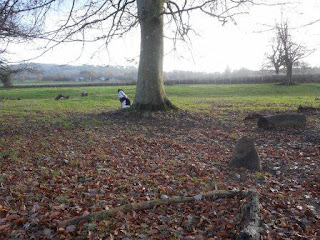Feral and Wilding
A few years ago I mentioned how much I enjoyed reading FERAL: Searching for enchantment on the frontiers of rewilding by George Monbiot. Recently I’ve been reading another exciting rewilding book called WILDING: The return of nature to a British Farm by Isabella Tree. In fact it was so exciting that one night I was still reading it at 5am. (Yes, I know. I am a bit weird.)The Knepp estate
Isabella with her husband Charlie Burrell owns the Knepp estate in West Sussex. For decades because the soil was so poor the farmland had been running at a loss so in 2000 they sold all their equipment and animals, paid off their £1½ million overdraft and with the help of grants (for such things as removing fences and undoing water management) left the land to nature.
Wildlife streamed in almost immediately, including species
the Burrells didn’t expect. They introduced free-roaming old breeds (as near as possible to their wild ancestors) of pigs, cattle and ponies
which turned the land into a mixture of woodland, wetland, scrub and pasture,
which ecologists now believe is its natural state. (Usually considered a nuisance, scrub is actually the richest wildlife area of all and a natural nursery for tree seedlings.) They also
discovered new sources of income such as wild meat and safaris. They dream of
reintroducing native animals such as wild boar, beaver, lynx and wolf.
I need no persuading about the benefits of wild land. Nature
is what keeps me happy and sane(ish) and the wilder it is the more I like it,
but for those who need persuasion there are tangible benefits. Wild land
can reduce flooding, rejuvenate soil exhausted by farming, bring down carbon-dioxide emissions (through carbon 'sequestration'), decontaminate air and water, safeguard biological diversity and
provide pollinating insects. The psychological benefits of being out in nature, especially in the sort of landscape described above, have been proven and, as Isabella Tree says, as humans we have been intimately connected with nature for 99 per cent of our evolution. 'Sever that connection and we are floating in a world where our deepest sense of ourselves is lost.'
Unlike conventional
conservation where habitats are maintained artificially – for species which
may not actually like those habitats best but have nowhere else to go - rewilding needs little input from humans. We (in the UK and Western Europe) are now so efficient at
producing food that we have a surplus. Farmers could be given grants not for farming
but for rewilding. We could have a linked series of rewilded areas and rotate
them – something which is perfectly possible with modern machinery.
Phew. That’s a very brief summary, and probably full of
mistakes. Do read either of the two books I’ve mentioned above if you want to
find out more, or you can contact a new charity called Rewilding Britain.
Talking of scrub and wild land, I realised this morning as I walked through this neglected little area tucked into a corner of a manicured National Trust park where Dog and I sometimes go, that it’s one of my favourite parts.
And I realised why. It's because nature's taking over and I never know what I'm going to find here. It takes me back to my childhood. It feels real. It's an adventure. And, if that’s not an argument for rewilding, I don’t know what is. (Ellie likes it too. As soon as we arrive, she vanishes at speed into the undergrowth - which is why you can't see her in the picture.)
And here’s Ellie, sitting wistfully under a tree in the official part of the park.
I was going to talk about The Novel as well in this post but
I’ve gone on far too long already so perhaps I’ll save that for another day.




No comments:
Post a Comment
Your comment won't be visible immediately. It comes to me first (via email) so that I can check it's not spam. I try to reply to every comment but please be assured that, even if I don't, every genuine comment is read with interest and greatly appreciated. Thank you!